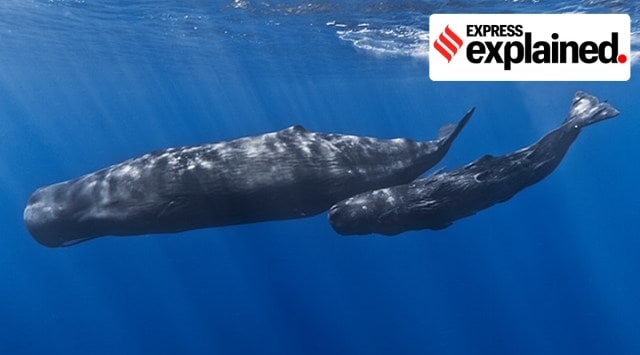AMBERGRIS

Ambergris worth Rs 4 crore found in dead whale: What is this rare substance, how it’s used
Days after the carcass of a sperm whale washed up on a shore of the Canary Island of La Palma, a pathologist, who carried out the animal’s postmortem, found ambergris, also known as ‘floating gold’, stuck in its colon, The Guardian reported on Tuesday. The lump retrieved from the sperm whale is estimated to be worth about €500,000 (Rs 4,47,62,500).
What is ambergris?
Ambergris, which means grey amber in French, is a waxy substance that originates from the digestive system of protected sperm whales. While it is incorrectly referred to as ‘whale vomit,’ one of the theories about its formation suggests that it is produced in the gastrointestinal tract of some sperm whales (or cachalot) for the passage of hard, sharp objects that are ingested when the whale eats large quantities of marine animals.
The ambergris is said to be passed like faeces and has a very strong faecal odour combined with a strong marine odour. The freshly passed ambergris is a light yellowish substance and is fatty but as it ages it turns waxy and gets red-brownish, sometimes with shades of grey and black in colour and attains a mild, earthy, sweet smell but still with notes of mild marine odour.
What are the uses of ambergris and why is it so expensive?
Ambergris is a rare substance, which contributes to its high demand and high price in the international market. Traditionally, it is used to produce perfumes which have notes of musk. While there are records of it being used to flavour food, alcoholic beverages and tobacco in some cultures in the past, it is rarely used for these purposes presently.
Legalities in India
While there is a ban on the possession and trade of ambergris in countries like the USA, Australia and India, in several other countries it is a tradable commodity, though with limitations in some of them. In the Indian context, sperm whales are a protected species under Schedule 2 of the Wildlife Protection Act and possession or trade of any of its by-products, including Ambergris and its byproducts, is illegal under provisions of the Wildlife Protection Act, 1972.
Comments
Post a Comment